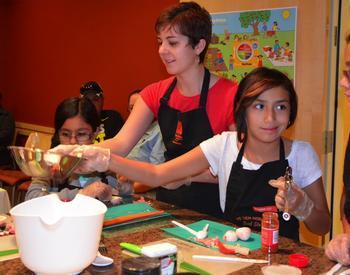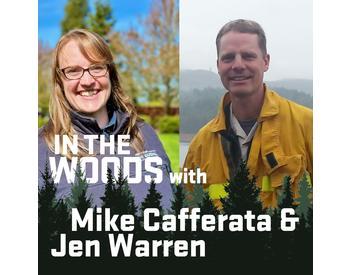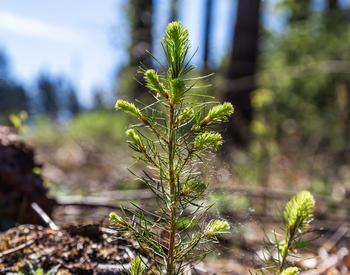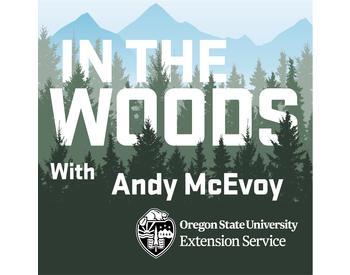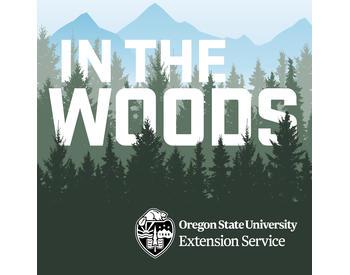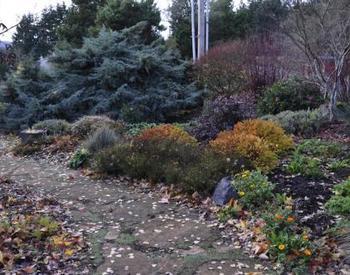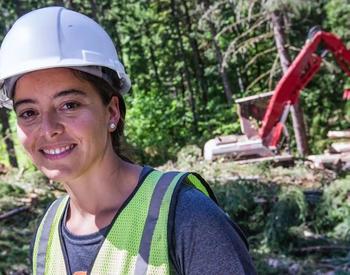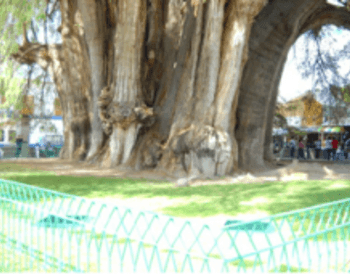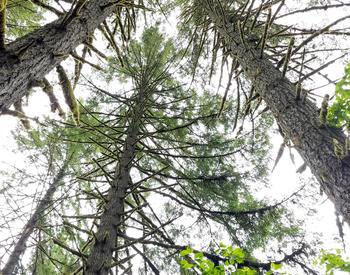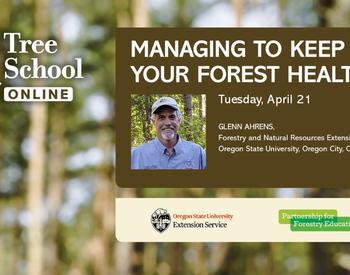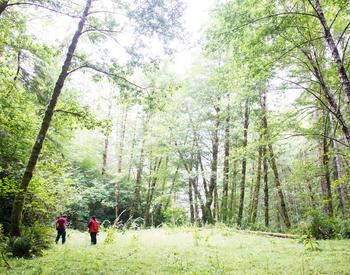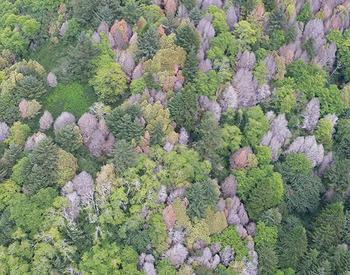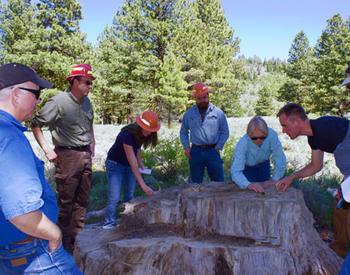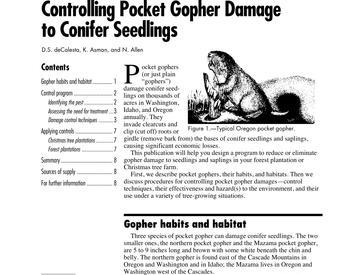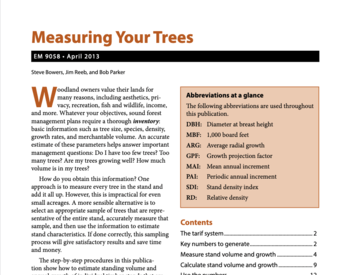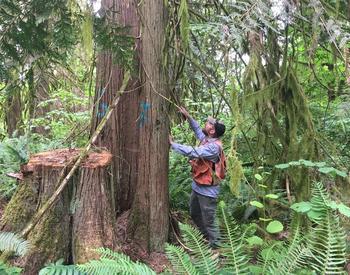Transcript
From the Oregon State University's Extension Service, you are listening to In the Woods with the Forestry and Natural Resources Program. This podcast aims to share the voices of researchers, land managers, and members of the public interested in telling the story of how woodlands provide more than just trees.
They provide interconnectedness that is essential to your daily life. Stick around to discover a new topic related to forests on each episode. Welcome back to another episode of In the Woods. I'm your host, Lauren Grand, associate Professor of Practice and extension agent in Oregon State University's College of Forestry.
We're so excited today to have Tiffany Hopkins back on the podcast. Welcome, Tiffany. Hi. Thanks for having me. Yeah, Tiffany has brought along a few Master Woodland Manager volunteers with her, and we're gonna talk about the Master Woodland Manager Volunteer Program here at Oregon State University Forestry and Natural Resources Extension Program.
This is such an awesome program and I'm so excited for more people to learn about it. Um, but before I ask Tiffany to dive deep into that, I want to introduce you to our Master Woodland Manager. So welcome to In the Woods Master Woodland Managers. Howdy, howdy. Hi. Susan Watkins is our first Master Woodland manager.
Do you wanna tell us a little bit more about yourself? Um, well, my husband and I came to forestry very late in life. We retired up here to Oregon and um, we had Christmas trees that we were growing. We knew nothing about forest. We thought they'd been growing for thousands of millions of years. They know what to do.
Which meant we had, uh, poison oak and blackberry and Canada thistle instead of trees. Um, so we had to take the basic forestry short course and the Master Woodland Manager program and get things, you know, straighten that forest up. All right. Tell that poison oak where to go, right? Exactly. And welcome Brett.
Tell us a little bit about yourself. Well, my name's Brett. I've been living in Oregon all my life and my family moved to Eola Hills, uh, or the mid nineties and, uh, about 240 acres of mixed species, mixed age woodland. And I, you know, I never realized how much of a gift that was to grow up in a forest until I moved away and lived in the city.
Uh, got to the point where I, you know, I worked computer tech jobs and really realized that there was something I was missing. And when I ended up moving back to the property, uh, with the intention of building a house, I, I really realized that, uh, I didn't know the first thing about how to manage a forest, and I, at this point, I was already getting very deep into permaculture and, uh, really wanted to understand whole systems.
And I, I took my first, uh, woodland management course with Glenn Ahrens over at Hopkins, the demonstration forest, and kind of caught a bug. And so at that point, I ended up just diving real deep and ended up being becoming a master woodland manager with the ML County extension. It was, uh, been a great journey, but at that point it was, you know, going out into the woods identifying all the different tree species and plant species, and understanding how my little piece of land interacted with all the properties around it, and the rest is history.
Oh, cool. Yeah, right. We have to get more of those bugs for the OSU extension service to figure out so people get excited about the programs. Well, thank you. I'm so excited to have you both here and to learn more about your MWM experience. But before we get there, um, we'll talk to Tiffany a little bit more.
Tiffany, you've sort of, um, introduced yourself on the podcast before, but do you wanna introduce yourself one more time, and maybe in relation to MWM or extension in general? Yeah, sure. Um, so I also am, uh, born and bred Oregonian , and, um, just fell in love with the forests of, um, that just like at the base of Mount Hood, that's where I grew up.
And that kind of led me on this journey of how, how do I save and protect all the trees? That's how it started out, and then I realized that wasn't my actual goal. Um, but that's, that's where it blossomed when I was probably like eight or something. And so, yeah, that just, I've taken a bunch of twists and turns to end up back here and I now, uh, work for F&R extension and coordinate both the Women Owning Woodlands Network and the Master Woodland Managers program.
How wonderful to know when you're eight years old what you're gonna do when you grow up and then actually do it. So impressed by you. Lucky. So, um, Tiffany, can you tell us a little bit more about what the, what is Master Woodland Managers? Yeah, that's such a good question. Um it's, it's a hard question to answer.
I've found because the Master Woodland Managers program is so broad and extensive and has so many moving pieces that it's really hard to pin down exactly what it is. So I'm hoping that if I give like a basic overview that then the stories and answers of these two will help to paint a much broader picture.
That's my goal, um, because I feel like I never do it justice, but what the, what I would start out with maybe for the listeners is a lot of people seem to be familiar with the Master Gardeners Program, and that's where I can usually kind of start with people who don't know what Master Woodland Managers is, is if you know what Master Gardeners is, it's a similar type of program, but for people who love trees.
Um, or own trees or help to manage trees. Um, and so that's like the most basic overview I could give. And then diving deeper. What we do is work with small woodland owners to help them learn about, um, management goals and how to reach those management goals. And these are people who have some sort of, um, base knowledge.
So either coming from a deep family belonging, owning woodlands, and they've built this knowledge base, or they went to school for something around forestry, or hopefully they've taken some more of our basic forestry classes through OSU extension. So it's a much more in depth training, um, and much more extensive than our more basic level classes.
And so it consists of about eight modules, everything from what's going on in your direct landscape to management planning, forest health, um, watersheds and ecosystems, wildlife. Really covers everything we can possibly cram into those eight modules. And then the goal is, that it's an in-kind program, meaning that for every hour that our volunteers or participants spend in the classroom or in the field with our instructors, we hope that they will pay.
The expectation is that they'll pay those hours back in volunteer service. Um, and so what we're hoping for there is to take our like forestry and natural resources extension agents like you, Lauren, and expand their, your reach because there's only one agent for each county. Sometimes one agent covers two or three counties.
And so our goal is that we train people like Brett and Susan to be able to go out in their local communities and act as an arm of extension, um, and really be kind of like a first touch for a lot of people. And yeah, it's a statewide program. We started in the eighties and have trained over 600 volunteers at this point.
Mm-hmm. So, yeah. I hope that that covered enough of it. If you have questions that I should answer, you can ask me, but hopefully, um, through Brett and Susan's eyes will get a, a deeper dive too. Yeah, no, that was really great and a good summary. So just a, a good, like an advanced training on forestry and forestry management and um, then we have these wonderfully trained folks that can go out into the community and share their knowledge and offer peer learning opportunities to other landowners.
Yeah. Because, you know, I don't know about you, but I, it's fun learning from a friend and someone like you. It's harder sometimes to get yourself to go learn from a teacher, right?
Well, yeah that's been a really cool thing with Master Woodland Managers is we've discovered over the years that actually people would prefer that they would prefer to have their first interaction be with someone who is a peer, who understands them, who isn't like a scary expert like you, Lauren, coming out your property.
I'm not scary. And you know, like judging them or whatever, and it, you know, we know that that's not what happens, but you also know what it can be like on the other end. When you don't feel as knowledgeable on a topic, it can be intimidating and scary. And so to have someone that knows what you're going through and knows where you've been just coming into owning Woodlands or whatever. Um, to be there to help you and be like a friendly face has really been a positive, um, um, outcome of the Master Woodland Managers program. I also feel like people tend to also, uh, worry that they're doing the wrong thing and that if they were to contact somebody that's official, they, they tend to feel like they're going be found out they're doing all the wrong things.
And so when they, you know, when, when I'm talking to somebody, it's much more conversational. Yeah, yeah. Yeah, that's a good point. We appreciate your efforts and so that's a good, um, segue, sort of, we talked a little bit about, you know, maybe the client, um, perspective, but let's get some more perspective of the two of you.
So, um, what, what's been your experience with MWM? Brett, why don't you go first. Uh, so far, I mean, uh, I, I would say in my experience, the, I was both very lucky, uh, in the sense that when I came in, I was one of the last classes to, to come through right before Covid. Mm-hmm. So, you know, everything was, uh, still open and, you know, we're all packed into the vans, driving out to the, the different, uh, logging sites and, and, you know, creeks and, uh, you know, we're, we're out in the field.
And, and I don't think that that would've happened, you know, well, it didn't happen for several years before the, the next class was able to come through. Uh, and, you know, so on one hand I, I was lucky in that way, but, and I was also unlucky because for the next few years, not really many in-person opportunities. But, you know, for me, uh, what it really did is it got me, uh, linked to my local small Woodlands Association.
Uh, it actually, uh, became a, a great shoehorn for the industries that I ended up working in, which is in, uh, uh, small hardwood sawmills. You know, it's actually provided me with a lot of opportunities to speed on the same level with a lot of people who are actually in industries to have those conversations about what small woodland owners are needing and what they're wanting and, and what they're are trying to.
So, uh, I, I would say for me it was, it was a great experience, uh, just in networking, if nothing else. Uh, but on the, on the flip side, you know, it's actually helped me grow and, and being able to have those conversations, like I was saying before, rather than coming at somebody either trying to tell them what to do or even coming into a situation where I don't feel like I really understand, you know, maybe I'm talking out outside of my, my breadth.
Uh, you know, it's, it's much easier to have these conversations now because of, of going through that Master Woodland Manager uh, training and where I'm actually able to give advice where I feel confident and, and I feel like people are actually getting a benefit from what I'm saying, rather than just either me talking at them or, or me not knowing enough, uh, to actually help them with what they need.
Plus I've met a lot of really cool people. Yeah, that's been really great. I bet it's been nice to, have you gotten to meet more of your neighbors or people in your community that you could interact with as well? Yeah. Yeah. And you know, actually what was very odd is at the same time I also, uh, ended up becoming the, uh, water master for my local municipal water supply.
And, you know, while water, you know, is slightly adjacent to, to woodlands, uh, is something that everybody cares about and is very, very important to everybody, it also gives you that, uh, extra, additional bonus content that you can provide to the people that you're talking to in your, neighborhood. You know, people who, you know, first you're talking to 'em about water and then, and then you're starting to, you know, assess the trees that they have on their property.
And, and then, uh, you know, the conversations start to naturally, uh, you know, move towards like habitat. You know, people, a lot of people are really interested in adding habitat to their properties and they don't know the where to even start. And so absolutely as an extension of the property that I manage, uh, my family property, uh, it, it just starts to, uh, like ripples in a, in a pond.
It starts to go outward and, you know, neighbors start to add more to their properties, which extends the habitat for mine onto theirs. And then, and then even further. Yeah, that's really cool to be able to build those connections in person and then through the landscape. That's, that's really great.
Absolutely. How about you? Yeah. How about you, Susan? Um, how, how's MWM been in your experience? Yeah, I'm sitting here nodding as, as Brent talks, but my, uh, experience is very different from Brett. Um, I actually like to tell people what to do. I'm a, I'm a lawyer and I, my career was in government. Um, so I was very interested in policy aspects of forestry, and it started in the, the Master Woodland Manager class that I took, which was amazing.
As, as Brett has described it here. You ordinary human being are being taught by these fabulous world class researchers in all these different topics. I mean, OSU just has amazing people they can draw on for this program. Um, but, one of the projects that we got involved with in my class, which was 20 years ago, was the developing the ties to the land program.
So this is a succession planning program that we created for forest owners, but it's really for anybody with resource lands, um, who has this idea that they want to leave the land they've been managing to another generation or generations that will maintain it or enhance it in some way and have those management goals move forward into the future.
So, um, I worked on that program, uh, with Chal Landgren and Brad Withrow-Robinson and Clint Bentz, who's an accountant and also, I don't know if he's a master woodland manager, but he's a master forestry person and has a family, multi-generational family, uh, forest and, um, Mark Green, who was with, at the time with the Austin Family Business Program.
I think they've even changed the name of that program now at OSU. But, uh, so we put that together. And then I, I really like this policy sort of aspect of forestry and when I had the chance to join the Committee for Family Forest lands, I jumped at it. That's, uh, a committee appointed by the Board of Forestry to advise the board about matters of interest to small landowners, family landowners.
Uh, and I was able to serve on that board for, uh, two terms plus a year as the interim chair. And, and that was, uh, another fabulous experience that I could not have done that, uh, and contributed anything to it without having had this experience from the Master Woodland Manager course.
Because as I mentioned, I mean, we knew nothing about forestry here. My husband is a city boy and I came from small town New England through big city, Midwest, you know, out to the West coast. And we thought, oh, you, you're gonna, we're gonna put granite stones through all the little creeks on our property.
And get rid of all that nasty vegetation and whatnot and, and have this park. And, uh, took a basic forestry short course and came home and said, "No stones, no..." Keep the grass, keep the, we need to slow the water down. Yeah, no. You know, so we're starting to learn basics that, that neither of us knew. Uh uh and, and it's just been fascinating.
And since I've been off the family forest lands, I've been working with my local chapter of the Oregon Small Woodlands Association serving on the board. And oddly enough, Brett and I both work on the local newsletter for our Yamhill County chapter. Oh, nice. Keeps it all together and, and I try to make sure things are spelled correctly.
So, trying to reach landowners in a broader sense. I haven't done a whole lot of one-on-one, but I've certainly tried to put programs out there that will help landowners. Well, Susan, if you ever wanna volunteer by editing my things, I am a terrible speller. You are welcome. . . Susan is amazing.
Well, it sounds like you, yeah, you described some of the volunteer experiences that you enjoy putting together classes and working on the boards. Um, was there anything, any other volunteer things that you like to do that you wanna share? Or did that pretty much cover it? Oh, that pretty much takes up all the time.
I, I do write some articles for the newsletter and I enjoy that a lot. I got to learn about, about the, uh, Emerald ash borer um, this last time. Um, and we're going to expand that. This is, this may be another aspect of this I've already done one or two articles for our local newspaper here in, um, McMinnville about forestry, and we're going to do another one about the Emerald ash borer.
Uh, Alex Gorman, who is our new extension agent, uh, is on the statewide committee that's studying that. Um, and if, I don't know if listeners will know that this, uh, pest is now in Oregon and is threatening pretty much all of the ash trees that live in the state.
Yeah, thank you. That's a really important topic.
We did do an episode on it in June, so head back and look through our library and uh, listen to that emerald ash borer episode. Thanks for bringing in that and writing articles is really great. It helps us out a lot 'cause you reach a lot of people and you share your knowledge with so many.
What about you Brett? What type of volunteer activities do you like to do? It sounded like you liked site visits. Oh man. Uh, I, I volunteer for way too many things. I, I actually tell people I need to say no more often. Uh, I say yes way too often. No. I, my interests are, are far and wide, uh, but they all kind of seem to shoehorn into each other mostly.
Uh, especially, you know, I, like I said before, doing Master Woodland Manager, I was, uh, really into permaculture, which I still am, but that leads you down all these rabbit holes from, uh, soil ecology, uh, hydrology to, you know, wildlife habitat. To, uh, different tree species and how they interact with each other, the difference between conifer forests and hardwood forests.
And so I ended up volunteering for the Oregon Bee Atlas, uh, before I ended up being a Master Woodland manager. Uh, so I, I find myself on different, uh, boards and, and groups and, and it's funny 'cause a lot of them end up actually becoming, uh, another opportunity for me to talk about the forest. You know, I, even when I'm talking about bees, I'm, I end up talking about, uh, all the the, uh, shrub life, uh, in trees that bees, uh, native Oregon bees love to, uh, frequent from our big leaf maples.
They love to all the willows and, you know, the currants and the, uh, you know, the native plums. And there's just so many things that, uh, our forests are forage and, uh, nesting habitat for native bees, and most people don't know anything about it.
Not to mention the, the flow of water. I'm, big into the, uh, the, the way water flows through the landscape, especially here in Oregon with the, the soil types that we have. Uh, and, and especially as climate change continues to change the, the Willamette Valley to the point where we're getting these really, really hot summers and then really wet winters.
Uh, we're ending up with, you know, floods and then, uh, droughts, floods and droughts. And so, uh, like what Susan said, it's, you know, so important to slow the water down. And so at any point I'm, I'm talking to somebody about, uh, one topic and then that leads into a master woodland manager topic. At least, it always seems to find that way into talking about, uh, how people can implement some of these practices within their own woodlands.
And even if they don't have a, a very small piece of property, I mean, people think that they need to have hundreds and hundreds of acres to actually make a difference. But so often, even just, uh, even a, a suburban lot can do a lot for slowing the flow of water, cooling the landscape and inviting the nature into their little piece of control.
And as far as volunteering goes, uh, you know, I, I even volunteer for my, my son's local venturing crew cuz we love to go out and hike and spend a lot of time outdoors. So it just seems to just naturally fit. Nothing more fun than sharing your passions with your littles, right?
Yeah. I mean, they're the next generation. We, we have to get them excited about it. Uh, the solutions are out there. We just have to actually make a concerted effort to do it, and, and the next generation are gonna be the ones that inherit all this anyway, so any way that I can share and, and pass that along, the better.
Great. So there were quite a few volunteer opportunities that were listed, you know, and they probably, Brett and Susan probably don't cover all the options. Tiffany, did you mind? Um, although Brett tries to, it sounds like. Um, but Tiffany, Susan, and Brett gave a great list of the volunteer activities that they're involved in, um, but I'm sure there's more that are available for others who might be interested in joining the program.
Can you share with us some other options for volunteering as an MWM? Yeah, definitely. So one of the biggest ones, um, that we didn't talk too much about was like, direct assistance or work with other landowners. So these one-on-one site visits where MWMs are going out to a neighbor and just helping them understand what it is they're seeing, or maybe helping them figure out what their management objectives are and where to go to for help.
Um, that's a really big one. Also hosting property tours of your own property. So having other small woodland owners come to your property to learn about what you're doing and see how you're doing certain things and, and, um, implementing certain practices on your property is a huge one. So both of those kind of fall under that landowner education category.
And then also, um, Brett and Susan did mention, uh, helping with a, a publication, and that's, that's another category that we count that is direct assistance to your local forestry and natural resources extension agent. That can be anything from something like that, helping with a publication or a newsletter, uh, to helping with a workshop or training that's going on, and that can be really helpful for our local agents.
And then, uh, this was also mentioned, but service, so helping or taking like a real leadership role in an another organization like the Oregon Small Woodland Owners Association, watershed Councils, things like that. And Brett really hit on this, which was great. Um, It's a lot about building confidence, so people might have already been in these organizations, involved in them, but it's, it seems like MWM really empowers people and gives them that confidence.
It boosts their confidence and, and feeling like they have the capacity and ability to talk about these things on a greater level than they did before taking the training, which really helps people step into those leadership roles. And so that's why we count hours on that. Um, and then also outreach to non woodland owners.
So something like Brett said, uh, taking his son's, I didn't catch what group it is. It's a venturing crew, so it is through the Boy Scouts of America, but it's, uh, for the older kids and it's high adventure, but mostly with a focus on outdoors. Cool venturing crew. I love that. I, I wanna be a part of that. Um, so I, I wish I would've known about it when I was a kid.
Yeah, totally. Um, so that's a great example of doing this outreach to younger audiences who obviously don't own Woodland property, but, um, we're, we're trying to help educate them as well. This could also look like staffing a fair booth or something like that. So your primary audience is not going to be other woodland owners.
And then the final one is, um, citizen science. And so Brett also talked about that and the, the bee atlas. But there's, there's tons of citizen science opportunities. The two main ones that MWM seem to engage with is the CoCoRaHS or, um, Oregon Season Trackers. And then eBird is a huge one. So yeah, so that's, that's the list.
But also we kind of say like, whatever it is that people are interested in and passionate about we'll try to work with you to figure out a way that, that you can volunteer in that capacity. And like, how cool to have someone like Susan who's super interested in the policy aspect of things, that's, that's not super common.
So it's like, yeah, let's run with that and figure out how we can, can get you involved. And so, yeah. Yeah, great, thanks Tiffany. Lots of ways to create value and see value and so that's a good segue into my next question for you both and, um, we'll start with Susan this time. Um, what do you see as the value of the MWM program?
Oh, wow. Well, I think, I think you've just heard a lot of value, um, from all three of us. Uh, right now I, one thing that Brett touched on, um, that comes to mind immediately is the value to me. I mean, I, I came from a base of zero knowledge, you know about forestry and really very little knowledge about trees, and other plants in the forest.
Um, and I just learned so much, and as Tiffany was just saying, that confidence builder to be able to talk to people who have spent all their adult life in the woods, or I should say all their adult life working in the woods. Maybe they spent all their youth in the woods also, and now I can talk to them. I can be a peer with them, even though I'm never going to cut a tree down myself.
You know, I'm never gonna fell a tree. But I could tell them when they might think about doing it. You know, I could tell a landowner this, this might be a good time to go into this, uh, part of your forest, this unit, and fin this section. Uh, or maybe you've planted the wrong trees here and you might think about weeding them out and, and putting in the right trees.
And, uh, just, uh, from, from my personal point of view, it, it was an amazing educational experience and really an eye-opener about what the world looks like. Uh, and then obviously, you know, we've talked about. All these different ways we reach different people, forest owners, neighbors who might not be interested in managing their forest, but can understand what you're doing and why you're doing it, and then the greater world out there.
I, I think it's a tremendous program. It's the best program I've ever participated in. Oh, cool. That's awesome. Yeah. All right. Tiffany, pat on the back, right? Well, I wasn't around during Susan's journey. That was probably Nicole. Well, so that's amazing value. And you touched a little bit on, um, what the value for the local forestry community.
Do you have anything to add in terms of what value it adds to our local forestry community? Are you still talking to me? Yes. Yeah, well, I, I mean, I think all the things that we've talked about, um, as I look around our small Woodlands chapter, for example, the leaders of the chapter are mostly Master Woodland Managers, and, you know, I think people who have been through that course really feel, you know, you're, you're empowered, you're educated, you have all this knowledge and it seems so important to get it out there.
And to make sure that other people know about it. And, and one of the things that we try to do in our chapter is to introduce our members to other experts they can talk to, uh, which might even be the county assessor.
You can talk to them about how forest land is valued, uh, or it might be people from the Soil and Water Conservation District, or the Watershed Council or you know, other groups that are working with forestry. So you find out what these other resources are and then of course we have our stewardship Forester come in from, um, Oregon Department of Forestry and, and just all these different groups to come and, and present.
We even had at our, uh, annual meeting a couple years ago, we had the Committee for Family Forest Lands come and talk to us. So we, you know, we try to reach out to all these groups and they're more than accommodating to us. So that's, that's an important thing that I think if there weren't so many of us who've had this training, we, we would be isolated too.
We wouldn't know about all these resources that are out there and, and try to make them available to our members. Yeah, it's a great, great networking opportunity. Great sharing of knowledge. That's wonderful. How about you, Brett? What do you see as the value of the MWM program? Well, uh, I'd say I echo a lot of what Susan was saying about, uh, the value to myself.
I, I, you know, I have about 240 acres and that property is more than big enough for any one person. And, and my father had been, uh, managing it himself for, uh, many years. And like I said, when I first decided to come back to the property, I didn't know the first thing about how to actually manage the property. I knew I loved it.
I just didn't know what to do. I knew logging had something to do with it. I just didn't know how to log, you know, how, how to actually run a, a logging operation or do even to do a timber cruise. And so it, it was a, a huge value in just that very, uh, on the ground kind of training that, you know, I could have learned if I went to college for it, but that wasn't my, my true calling to, to be an academic in forestry and there was a huge bonus to being able to effectively manage this piece of property and, and to understand its place in the landscape.
But also, uh, beyond that, uh, the big bonus for me was to, uh, learn how to create a forest management plan. And I had never thought of that concept before the master wooden manager course.
Where you actually create this living document that your family can pass on that describes your values, what your intentions are, and how you're moving gradually towards those goals that take time. Because trees take a long time to grow and you never wanna make a lot of changes all at once. So, you want to make a change, assess, reevaluate the feedback loop and make sure that you're getting the results that you want to get to maximize. If you're trying for timber, you wanna make sure that the, the choices you're making early on are actually going to lead to, uh, trees that will actually be marketable.
And, and so if there's anything that I, that I would say that the value has really rippled outwards is to encourage other families who have, let's say, a trust, but like a, a piece of property that the family feels connected to and wants to keep it in the family, or at least you see so often, uh, families fight over what their values are and, and how they want to manage the property, and it usually is about the time that the, the parents or the grandparents are on their deathbeds is when people start actually trying to decide as a group what they want.
And it's so much easier when you start, before you get to that point, when you can be proactive rather than reactive. And so the value of the Master Woodland Manager Program beyond the site visits and beyond the, the, the networking, which are amazing by themselves, is the, the, the forest management plan that, you know, comes out of this program.
And then becomes this, this living document that I've, I've already, you know, multiple times in the last few years have gotten people on that started on that road of, of creating their own forest management plans. And, uh, if you've never seen one before, you know, for those who are listening, they are, uh, fantastic.
They can be as dry as you want or as, uh, colorful as you want. And, and they really do, you know, bring people together rather than separate them. And they end up creating properties that are much more resilient in, in the long term. And, you know, sometimes properties still end up getting sold and partitioned off and all those different things, but as long as everybody is on the same page, you know, you can, you can, the, that Forest Management plan really brings people together.
I truly believe that that's one of the most important pieces that doesn't get talked about enough. It's one of the coolest aspects of the, the Master Woodland Manager Program and I'd say that provides a lot of value. Well, Brett, I need to take you on tour to my management planning classes because that was great.
This sold it way better than I can. And Susan, you must be like jumping for joy in that seat there with your helping put on that succession planning course and teaching all about the value of management planning and passing it on to your, the next generation. Yeah. And succession's so huge, and, and people don't think about it until it's too late.
Agreed. That's so great. Oh, go ahead Susan. Oh, I was gonna say, did, when you have that buy-in from the next generation, whatever, whatever that decision is, um, it makes doing your, your work now. That much easier because you either know it's worth the investment to do this, because well, whatever the investment's going to be that you're going to make in time and money and effort into the property, um, you know what the outcome's going to be in a, in however many years that you're gonna still be on that property.
And it, it might be, yeah, we're gonna log the whole thing and turn it into, uh, townhouses. Or it might be, you know, the grandchildren are gonna move on the property and keep it going, but whatever it is, you know, it what it is coming, it makes it a lot easier.
Okay, now come the money questions.
Are you ready? What do you love about being an MWM? Susan, go ahead you first. Um, I, I think that's all we've been talking about. This program, I haven't, I don't think I've said anything and I haven't heard Brett say anything or Tiffany say anything about what they don't like about being a MWM. I mean, um, you get to learn so much about the world that you live in.
Uh, you get to find out how you can better interact with it and, you know, keep it, uh, viable and healthy and, and to, uh, live up to the objectives that you want. Do you want a beautiful place to live? Do you want, uh, wild animals to abound? Do you want, uh, an income stream from trees? Uh, you know, what is it, what is it that you want, what's important to your family?
And, and you get to do it. You get to, you get to know how to do it. That's great. How about you, Brett?
Uh, very, very similar. I, I feel like, uh, what's what I love the most is interacting with the, actually going back to what Susan said, uh, quite a bit earlier, was interacting with the amazing staff from OSU.
People that I probably would never have interacted with otherwise. You know, I might have, say, read something that they wrote or, uh, you know, might, might have watched something that they created, but I ultimately would never have met them in person. And with the Master Woodland Manager program, uh, I've gone on field tours with some of the most amazing people who are so passionate about what they're doing and, and, you know, say what you will about specialists.
You know, some people get so, so tied into a single topic and you know it, they might not see anything else but what they're studying all the time. But at the same time, they're, they're just the most fun nerds to listen to. I mean, they, the, the knowledge that they're sharing is, is just a wealth. And I feel like I'm getting all the benefit here, you know, but at the same time, that part alone has been, uh, such a huge benefit for me.
Uh, it's influenced the way I talk to people and it influences the way I, uh, ultimately the, the course direction of the information that I share. And, by far it, it has sold me even harder into the program of the Master Woodland Manager program than, you know, a lot of things you'll get into, you know, it just, it's shearly just information.
Uh, it's, it might be interesting and cool, but it's, it's the people that really keep it going for me, like the, especially the, the professors, especially the, the research staff, uh, especially the other Master Woodland Managers. I mean, I've, I've gone to, uh, mini colleges, uh, is what it's called in the Master Woodland Manager.
Where you go out to a site, you, you camp out and you get to actually spend time with people. Like for instance, I spent time with Master Woodland managers that were in some of those early eighties courses. Mm-hmm. , you know, so like 1986, 1987, and you know, they are just so fun to listen to and talk to. So I would never have had that opportunity to talk to those people, uh, had I not been within the Master Woodland Manager program.
Those are my favorite types of people to listen to talk when they're nerding out on their specialty topic because it just gets you so excited and it doesn't even matter. And yeah, there's just some people that I'm like, you could just talk for hours, and I would just listen just because your enthusiasm is infectious I love it.
Yes. Talk about insects. Yes. Talk about wildfires. I just keep talking. I love it. Everything's dying and burning, but just go ahead, keep talking about it.
Well, my next question was gonna be what's your favorite, well, what's your memorable volunteer experience? And so, um, I was gonna say maybe that sleepover was, or that camping experience was memorable experience, but I guess it's not a volunteer experience. So do you have a memorable, your most memorable volunteer experience?
Brett, you first. Most memorable volunteer experience. That's a good question. I mean, I, I will say that, uh, especially with the, the Oregon Bee Atlas, which, you know, as, as one extension of, of the, the work I do with the Master Woodland Managers, uh, you are walking around with a bee net, uh, tends to catch a lot of, uh, gazes from people.
Uh, that, you know, almost always ends up, uh, people go, what are you doing? You catching butterflies? And it's like, no, I'm, I'm catching bees. Oh, like honey bees? No, not honey bees. You see this little teeny thing looks like a flying ant, that's a bee. And people are just, uh, absolutely blown away. But with the Master Woodland managers directly, I, I would definitely say that, uh, there's been a few site visits, uh, where I actually was, you know, at a property talking to a, a homeowner or a property owner that, you know, really, uh, you know, I, I could actually see the value that I was providing because of the, the questions that they were asking and, and the excitement that they were, they were showing to me.
And, you know, I wish, I wish it was funny. I wish it was really interesting. But it's, it is one of those things that, uh, keeps, keeps you excited when you see other people actually getting excited by the information that you're providing. Yeah, it's always, um, it's always a trip for a thrill or, you know, a little, uh, gateway drug when you're teaching or interacting with someone and they get your excitement, gets them excitement.
It sort of just fuels that. Yeah, you, you can tell that they're not just, uh, glazing over and you, they're not receiving anything that you're saying. You know, it, it's great when you actually can tell that they're into it and they're, they're, they actually are, uh, are seeing value and they're, they're, they have more questions than than time you that you have, you know, and that's, that's always actually a really good feeling.
That's awesome, though. That's showing that your like. You are giving to others what you received from the Master Woodland Managers. You know, the experts that you were listening to and they were feeling that from you and makes them excited, and then you're able to give that to landowners and they're feeding off that energy that you're giving.
That's cool. Mm-hmm. Maybe, maybe I'm getting, you know, people are maybe catching the bug. Oh yeah. Get some more Master Woodland Managers. There's those bugs again. I love it. How about you, Susan? What's your most memorable volunteer expetience? You know, it's, it's so hard to say because it's all been a wonderful experience, but I have had the opportunity through the state, uh, Oregon Small Woodlands Association to testify at the legislature a couple of times.
And, um, and that's, that's really kind of breathtaking for me, to, to be up there in front of a, a committee and telling them what's important about this bill, or whatever it might be to small landowners.
And one time I, um, this goes back a few years, but they had a committee called The Big Look, which was supposed to be looking at all our land use rules in Oregon, and one of the sections was forestry. And our meeting was, it must have been in January. Um, I live about, uh, 45 minutes from the Salem Capitol. It was ice and snow all the way, but I made it.
I went, I testified. Yay. Um, I'm not sure the committee ever came up with a report, uh, but we tried our best. Yeah. Wow, how thrilling to be able to use the knowledge that you learned in the program to be, you know, go to the capitol and testify for what you believe in and know that you have that knowledge base to... exactly, exactly... to base that, that's so great.
Well, thank you so much all of you for joining me today to chat about our MWM program. Do you have any last minute? Anybody have any last minute remarks you wanna make? Something I didn't cover? Hmm, uh, get, get interested in water. Uh, people should be more interested in water. All right water master.
And, and Brett is right, but the immediate, we have this immediate problem of this, uh, emerald ash borer. So I'm gonna ask people to learn more about that and, uh, and be prepared for when it hits their ash trees.
Thank you very, both very important topics to share. Yeah. Thank you. So as we were listening today, if you have any questions come up or we didn't cover a specific topic that you wanted us to cover, please feel free to drop us, comment or send us a message on our website at inthewoodspodcast.org.
But don't leave us just yet. We have our lightning round coming up.
Okay. Welcome. So, as usual, before we end our podcast, we're gonna go around the virtual room here and get a few final questions from our guests, uh, about a little bit more personal topics. So, Susan, let us know what's your favorite tree? Uh, madrone because it's a deciduous evergreen with a beautiful red bark.
Ah, lovely tree. How about you, Brett? Susan, you took my favorite tree. You can't do that. Well, uh, how about this? Uh, my, uh, if it's, if I can't use Modrone, which is my favorite tree, uh, I, and I, I think it'd be too easy to say Oregon White Oak. I, I'm gonna have to go the, uh, Pacific yew. That's, that's a fantastic tree.
Yeah, and Tiffany, you've been on the podcast before, so I'm gonna ask you, what's your second favorite? Yeah, my second favorite tree would be a big leaf maple, and for lots of reasons, but we grew up with a giant one outside of my bedroom window, and I loved the shade that it provided, and now I love tapping them and getting the sap and being able to make syrup out of it. I think that's pretty cool.
Is it just me or does big leaf maple syrup taste a little bit more vanilla than, like, has more of a vanilla flavor than regular maple syrup? Maybe it's just me. That could be your interpretation of the taste. I'll take that. My interpretation. Okay, so the next question is, what's the most interesting thing that you bring in the field with you, whether it be in a vest or a field kit, or if you're just a, uh, pockets type of person?
Brett, why don't you go first this time? The most interesting thing I bring into the woods besides a bee catching net. Honestly, the thing I love the most is my, my heavy duty pair of loppers. 'Cause you're always running into Himalayan Blackberry. Yeah. Oh yeah. Get those thorns out of the way. How about you, Susan?
Well, I don't know that this is interesting at all, but I always have my hand clippers with me. But if I am going, really going into the woods to go into the woods, I think the most important thing to have is a pair of gloves. Grabbing those blackberries and pushing them out of the way. Double protection.
Okay Tiffany, is there something that you'd bring into the field with you that you haven't told us about before? I was trying to think like, do I bring something specific for when I'm out in the woods with the managers, like for the Master Woodland Managers trainings, and I was like, I always have a camera and a clipboard.
And the camera is just to take pictures of everything that we're doing, 'cause I like to tell the story of the Master Woodland Managers and um, that's such a big piece to me. And then a clipboard so that I can write down everything that's like coming up as far as like, resources that people mention. So I can like, send those out afterwards or so that we can post them onto the canvas.
So, yeah, neither one of those things are super interesting, but that's what I bring. But unique to MWM, we appreciate that. Yes. Yeah. Yep. And then our last question is, what resources would you recommend to our listeners if they're interested in learning more about Master Woodland Manager or volunteer programs or small woodland management?
And Tiffany, I'll let you go first so we can start with our MWM website. Yeah. Yeah. We'll, um, link that below. So if you're interested in the training, um, like taking the training, if you are a small woodland owner, um, you can check that out. Also, if you're a landowner that's maybe interested in having a mass woodland manager come out and chat with you, there's resources for you on that website also.
Um, and then there's also some resources there for our current MWM volunteers. Um, and then, yeah, my other favorite resource, um, is the... well, no, it's the Know Your Forest Learning Library page. Um, and then the extension, what's that called, Lauren? 'Cause I can never remember the extension...
Catalog? Yeah, the but what's, is it just the extension catalog?
Yes. The extension website? It's the, it's the catalog. They don't let us send people to the catalog anymore? Oh, yeah. Well it's the extension catalog of like forestry publication. So, that's my favorite. I'll just like, we can link that below too, but that's like my favorite 'cause it's more in depth than the, than the know your Forest Learning library page.
It's a little more like scientific based. So I think those are like two good ones. Okay, great. Susan, do you have any, um, resources that are just go-to for you that you wanna share? Um, well, even though I'm a Master Woodland Manager, my favorite resource actually is my stewardship forester from the Department of Forestry.
Um, I find, I've found over the years, the stewardship foresters I've worked with are so willing to work with landowners. I know they probably have to go out sometimes and cite people for violations of different things, but they are more than willing to work with you if you need a workaround about something because of the peculiar circumstances of your property.
So, um, I don't hesitate to send people to the Stewardship Forester if they're willing to talk to a government employee. Uh, as far as like online resources. Tiffany actually just put together a wonderful collection of video courses from all different forestry topics that, that she sent around and I don't know if you can link to that from your program, but that is a, it's wonderful because it just covers so many topics and they're all these little online courses.
Oh, thank you. That's great, Tiffany. You'll have to send that to us so we can put it on our website. For sure. And we'll put the Find Your Stewardship Forester website through the Oregon Department of Forestry on our website. So if you don't live near Susan, you can find your very own stewardship Forester.
How about you, Brett? Any resources that you'd like to share. Yeah, so, uh, obviously I, I'm interested in a lot of different topics that all kind of, uh, end up being very beneficial to the Woodland owner. Uh, but a few things that just come up to my mind. Uh, number one, I recommend people who are interested in the way water moves across the landscape to look into the book, uh, Rainwater Harvesting for Drylands and Beyond by Brad Lancaster. You know, he actually, the author is in Tucson, Arizona, so some people might think that that book is not applicable to their location, but it's actually a very, very in-depth but easy to digest book about how we can all do our little bits here and there to, uh, support the growth of trees using the water that just falls naturally from the sky.
And I think that's gonna be a problem that we'll, we'll see more and more as, uh, our trees become more and more stressed from the, the long, hot summers. But, uh, additionally, I, I highly recommend people look into the Tree School put on by the, our local Clackamas County extension. And they are fantastic.
They actually, uh, I should have said this earlier, they're, that program was what really got me into the Master Woodland Manager Program because of all the resources that I got just from, you know, several full days. Uh, you know, one year after another I'd go to the, the tree school and just absorb information all day long.
But since Covid started, uh, a lot of that information is all online. Uh, a lot of this information through the Tree School is being offered through Zoom, uh, or, you know, in other words, in virtual environments. And so even if you can't make it up to Clackamas to go to the Tree School in person, the tree school online has been a, a great help.
So I, I highly recommend. That's a good one. Yeah, great resources. And I'll have to check out that book. I haven't, I haven't read that one. Oh, it's fantastic. Very fantastic. Cool. Well, I've had the pleasure of talking to forest landowners that aren't MWMs. And have them talk about how great an experience it was to get a visit from or to talk to MWMs.
So it's been so nice to be able to chat with some MWMs today and Tiffany about how great the program is for them. Um, I'm glad to hear all the fun things that you do and all the great ways that you support the community, forestry and just your regular other communities. So thank you so much for joining me today and telling me all about your experiences.
Um, it's been so fun. Thank you, Lauren. Thank you. Thank you. Well, that concludes our episode of In the Woods. Don't forget to join us in a couple weeks where we come back to explore another part of Oregon's amazing forests. Until then, what's in your woods?
Thank you so much for listening.
Show notes with links mentioned on each episode
are available on our website inthewoodspodcast.com.
We would love to hear from you, visit the tell us what you think tab on our website to leave us a comment, suggest just a guest or topic, or ask a question that can be featured in a future episode.
And, also, give us your feedback by fillingout our survey.
In the Woods was created by Lauren Grand, Jacob Putney, Carrie Berger, Jason O'Brien and Stephen Fitzgerald, who are all members of the Oregon State University Forestry and Natural Resources Extension team.
Episodes are edited and produced by Kellan Soriano.
Music for In the Woods was composed by Jeffrey
Hino and graphic design was created by ChristinaFriehauf.
We hope you enjoyed the episode and we can't
wait to talk to you again next month, untilthen what's in your woods?
In this episode, Lauren Grand invites Susan Watkins, Brett Aldrich, and Tiffany Hopkins on the podcast to discuss the value of participating in the FNR Extension's Master Woodland Manager program. Watkins and Aldrich are both graduates of the program.
